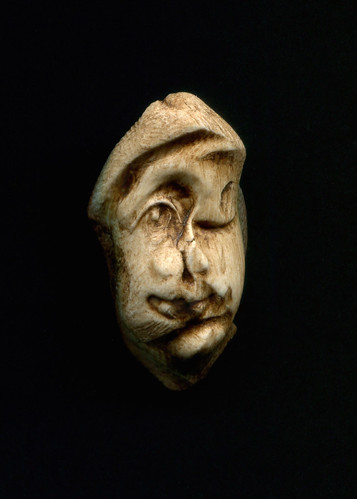A patron saint is one who in Roman Catholicism, Anglicanism, Eastern Orthodoxy, or particular branches of Islam, is regarded as the heavenly advocate of a nation, place, craft, activity, class, clan, family or person.
 |
| Saint Drogo by TheoJunior, on Flickr |
More amazing is that Drogo was said to be able to bilocate - to maintain his actual presence in two totally different places at the same time. Witnesses claimed seeing Drogo working in fields simultaneously, and going to Mass. If that is true, I'd make him a saint for being able to be "in two places at once" rather than for being unattractive due to an affliction. That disfiguring affliction turned him into a recluse. I can find no connection to coffee and actually found that Drogo only drank warm water during his years as a recluse.
Saint Giles was said to have lived as a hermit in the south of France in the later 7th century and stayed alive on the milk of a female deer. How do you milk deer? Anyway, not only is he the patron saint of the city of Edinburgh, but also the patron saint of breastfeeding.
Saint Balthasar is traditionally considered to be one of the biblical Magi (AKA The Three Wise Men or the Three Kings) who visited Jesus in the stable at his birth. As the King of Arabia, he brought the gift of myrrh. (Extra Trivia: Myrrh is a natural gum or resin extracted from a number of small, thorny tree species and used as a perfume, incense, and medicine.) At that time, Africa was frequently equated with Egypt. Some Romani sideshow merchants and entertainers were (mistakenly) thought to have come from Egypt (that is where the corruption of Egypt leads to GYPsies). Therefore, rather unfairly, this Egyptian king became the patron saint of playing card manufacturers.
 |
| One depiction of St. Julian murdering his parents - from a larger panel of art by Ansano Ciampanti |
My favorite unusual origin story is Saint Julian the Hospitaller.
Most of the Saints get tagged as "patrons" for a number of things. Julian is attached to clowns and circus workers, innkeepers, fiddle players, jugglers, childless people - and murderers. What a mishmash of things for a Saint.
How does a Saint get associated with murder? In this case, because he was a murderer. (Though the church would clarify this as a "repentant murderer.").
His story is a variation on the classical Oedipus Rex, which he apparently had not read or he didn't learn a lesson from it.
Julian was cursed (by a hart, just to make the story even weirder) that he would kill his parents. So that this would not come to be, he left home and traveled far away to live his life. He lives this distant life, acquires his own castle, and a wife.
But his parents are desperately searching for their lost son, and they finally found his castle. Julian was away on a hunt, but his wife (who I guess didn't know about the curse) welcomed her in-laws and honored them by putting them up in their master bedroom.
While his wife is at church, Julian comes home, finds the couple sleeping in his dark bedroom, assumes that it is his wife with another man, and kills both of them.
He fulfills the curse, but is obviously wracked with guilt. In order to get salvation, he (and his wife) build an inn for travelers, and a hospital for the poor and other charitable works. He was forgiven for his crime when he gave help to a leper who turned out to be a messenger from God who had been sent to test him.
He is the patron of hotel keepers, travelers, boatmen and murderers - at least the repentant ones.